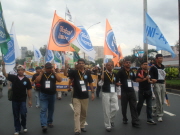"Let's overcome artificial division of labor" Trade Unions & NGOs.

|
Pro-labor groups, Migrant forums, Labor Activist in Asia, assess impact of financial crisis and discuss challenges and opportunities to organize – AMRC workshop in Bangkok, Thailand 9-11 March 2009. UNI Apro was represented by Jayasri Priyalal, Director, for Finance Sector activities at the workshop. “Never in a history of labor movement, have we seen for global, national solidarity as there is now. It is very exciting to be in labor movement now and our job is to assert for humanity. However, it is clear there is need to have rules not only for global finance but also for global trade & global production system” said Prof. Rene E Ofreneo at the workshop organized by Asia Monitor Resource Center [AMRC] in Bangkok, Thailand. Informal economy widening; in-formalization of formal labor market deepening, women, migrants, young & ageing workers worst affected. Employers withhold benefits, downsize in name of the financial crisis. Impacts of the Crisis on informal sector, migrant, domestic workers and self-help groups Apo Leong from AMRC explained the plight of 20 million migrant workers who are unemployed now in China. These workers migrated from rural northern parts of China to be employed in factories those were supplying to the global markets. Most of the factories have closed forcing employees losing jobs. As a result of the financial crisis there is mass social unrest in China. Workers have been demonstrating, striking and blocking highways to attract attention of the local government. People’s unrest is a serious concern for the Beijing government. AMRC the Hong Kong based independent non-government Organization convened the a workshop on the theme “The Financial Crisis: Challenges and Opportunities for Organizing” The two days workshop brought together labor activist representing farmer, fisherman, migrant labor and trade unions from fourteen countries in Asia including China. Labor activist from formal and informal sector worked together to map out joint strategies to protect the interest of workers after analyzing the impacts of the financial crisis on the jobs and the responses from governments and businesses. Learning from past lessons; Three case studies were presented from Argentina, Indonesia and South Korea highlighting as to how the trade unions, community groups, cooperatives responded to the miseries impacted on society following the financial crisis in the respective countries in the past. Each case highlighted the fact that innovative methods adopted to respond to the situations to mobilize people to fight and protect their rights. New tasks for trade unions, labour groups, and civil society organizations to promote workers interest as identified by the workshop were Introduce Livelihood development programs Delivery of essential services: education, health, nutrition Creation, protection of jobs through social entrepreneurship Corporate social responsibility monitoring Monitoring: corruption, tracking of public expenditures Research and popular education Advocacy: transparency and right to information, tax and spending reforms, macroeconomic reforms Skills development/HRD Political mobilization, etc., etc. Conclusions reached focused mainly on taking organizing activities to the community without confining them to the factory or the workplace focused only on the interest of the permanent workers. |





